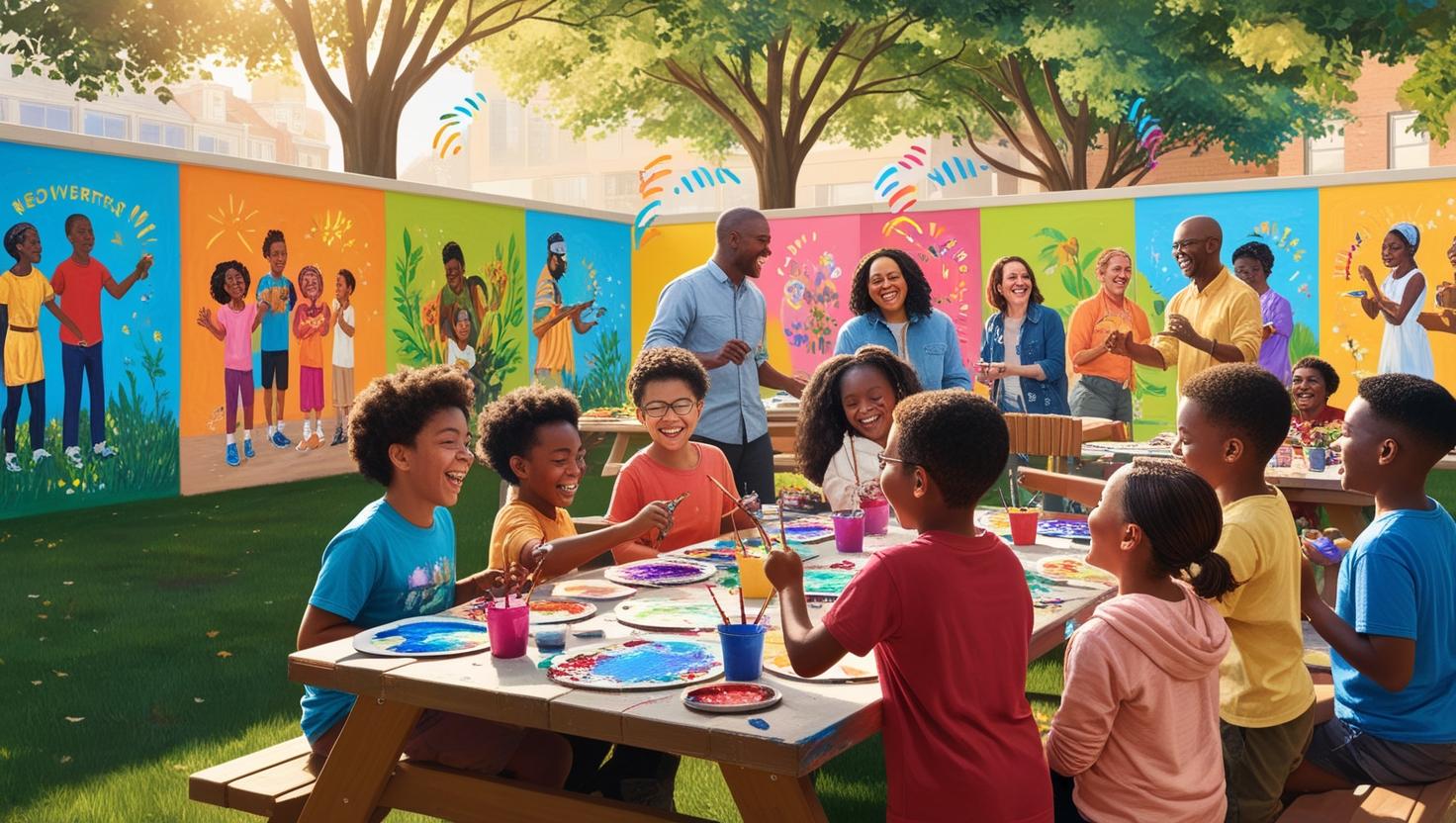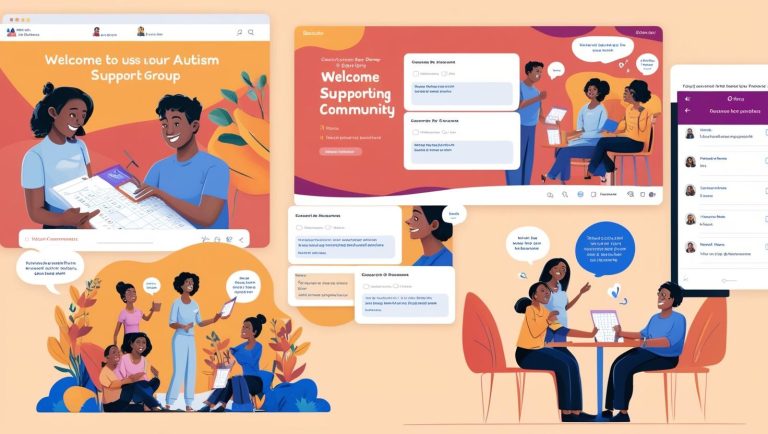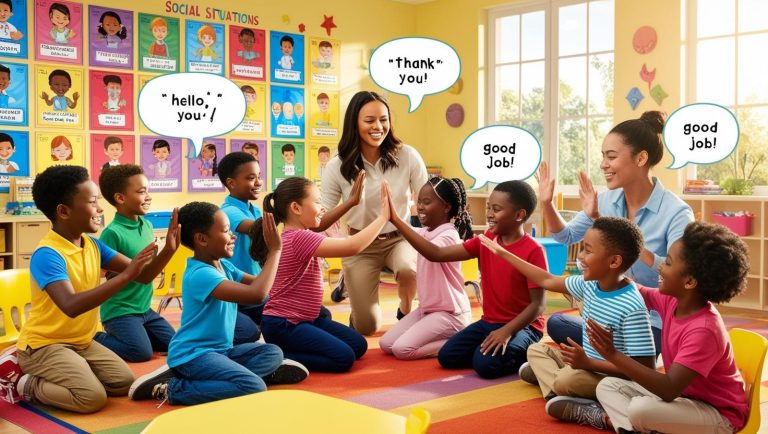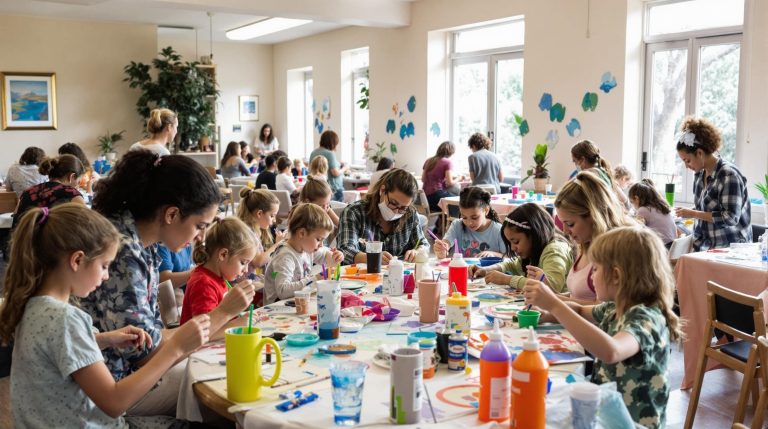Engaging in autism awareness events is a pivotal way to support research, education, and community inclusion for individuals with autism spectrum disorder (ASD). Participating in fundraising events like charity runs, auctions, and the Autism Speaks Walk helps generate financial resources and foster community solidarity. Attending educational seminars provides insights into ASD, covering latest research and best practices in support. Volunteering at support groups extends this impact by facilitating group activities, providing emotional support, and sharing therapeutic resources. Building inclusive communities through sensory-friendly amenities and adaptive events guarantees equal participation opportunities. By getting involved in these initiatives, you can contribute considerably to creating more supportive environments for individuals with ASD, and further exploration will reveal even more thorough strategies for community engagement.
Expert Highlights
- Participate in local fundraising events like charity runs, auctions, and bake sales to support autism awareness and research.
- Attend educational seminars to gain insights into autism spectrum disorder (ASD) and best practices in support.
- Volunteer at support groups to facilitate activities, provide emotional support, and share therapeutic resources.
- Help build inclusive communities by organizing sensory-friendly events and collaborating with advocacy groups.
- Engage in community awareness strategies through workshops, public discussions, and social media to mobilize support for autism initiatives.
Participating in Fundraising Events

Participating in fundraising events is a powerful way to support autism awareness and research. These events, such as charity runs, auctions, and bake sales, provide opportunities for communities to come together and contribute to a common cause.
By participating in these activities, individuals can help raise crucial funds that support research initiatives, educational programs, and support services for individuals with autism and their families.
For instance, the Autism Speaks Walk is a prominent annual event that mobilizes thousands of participants across various locations to raise money and promote awareness about autism spectrum disorder.
Such events not only generate financial resources but also foster a sense of community and solidarity, emphasizing the importance of collective action in advancing autism research and advocacy.
Through inclusive environments, these fundraising events align with Maangar Global’s mission of creating spaces where every voice in the autism community is heard and valued.
Attending Educational Seminars
Attending educational seminars is an essential component of autism awareness efforts, as it provides a platform for individuals to gain deeper insights into autism spectrum disorder (ASD).
These seminars often feature expert presentations from psychologists, educators, and healthcare professionals who share the latest research and best practices in diagnosing, treating, and supporting individuals with ASD. Participants can learn about early intervention strategies, behavioral therapies, and educational accommodations that can considerably impact the quality of life for those affected.
Additionally, these seminars offer opportunities for networking with other advocates and practitioners, fostering a community of informed and supportive individuals committed to enhancing autism awareness and improving outcomes.
With 1 in 44 children now being diagnosed with ASD in the United States, these educational seminars play a crucial role in helping communities understand and support this growing population.
Volunteering at Support Groups

Volunteering at support groups is a meaningful way to extend the impact of autism awareness beyond educational seminars. This involvement allows individuals to directly support families and individuals affected by autism, providing a personalized and compassionate approach to awareness efforts.
Maangaar Global resources provide comprehensive support for volunteers looking to get involved in local autism support groups.
- Facilitating Group Activities: Assist in organizing and leading activities designed to enhance social skills and emotional well-being.
- Providing Emotional Support: Offer listening ears and emotional support to families and individuals who may be facing unique challenges.
- Sharing Resources: Help disseminate valuable information and resources that can aid in daily life, such as therapeutic services or community programs.
- Advocating for Inclusion: Promote inclusive environments within the community by advocating for the needs of individuals with autism.
- Building Community Connections: Foster relationships between families and local businesses, schools, and other community organizations to create a more supportive network.
Building Inclusive Communities

Building inclusive communities is a cornerstone of autism awareness efforts, as it guarantees that individuals with autism have equal opportunities to participate in and contribute to society. This involves creating environments where people with autism can engage freely without barriers.
Community centers, schools, and public spaces can be adapted with sensory-friendly amenities such as quiet areas, flexible lighting, and accessible communication tools. Organizing inclusive events like sensory-friendly movie nights, adaptive sports programs, and autism-themed workshops further fosters integration.
Collaborations between local organizations and advocacy groups are essential for implementing these initiatives effectively. By promoting understanding and acceptance through education and community engagement, we can guarantee that individuals with autism are valued and integrated members of society.
The portal’s educational workshops provide comprehensive training for families and healthcare providers to better support individuals with autism in community settings.
Frequently Asked Questions
How Can I Identify Local Autism Awareness Events in My Area?
To identify local autism awareness events, check online event calendars, social media groups focused on autism support, and websites of local autism organizations. Contact community centers, libraries, and health departments for event listings.
What Are the Benefits of Participating in Autism Awareness Events?
Participating in autism awareness events fosters community understanding, supports individuals with autism, and promotes inclusivity. It also provides opportunities for education, advocacy, and networking, ultimately enhancing the quality of life for those affected by autism.
Can I Organize My Own Autism Awareness Event?
Yes, you can organize your own autism awareness event. This involves setting clear goals, choosing a venue, planning activities, securing funding or sponsors, and promoting the event through various channels to engage your community.
How Can I Involve My Family in Autism Awareness Activities?
Involving your family in autism awareness activities can be rewarding and educational. Encourage participation in local walks, fundraisers, or volunteer programs. Engage in discussions about autism, share personal experiences, and support advocacy initiatives together.
Are There Any Specific Etiquette Guidelines for Interacting With Autistic Individuals at Events?
When interacting with autistic individuals, respect their boundaries, communicate clearly and patiently, avoid sudden noises or touches, and be open to their preferred communication methods. Prioritize their comfort and consent in all interactions.
Expert Final Thougts
Participation in autism awareness events is vital for fostering a supportive and inclusive community. Fundraising events generate essential resources for research and services, while educational seminars provide valuable insights into autism spectrum disorder. Volunteering at support groups offers direct assistance to individuals and families affected by autism. Building inclusive communities involves implementing accessible practices in public spaces, educational institutions, and workplaces. These collective efforts contribute greatly to improving the quality of life for individuals with autism.




